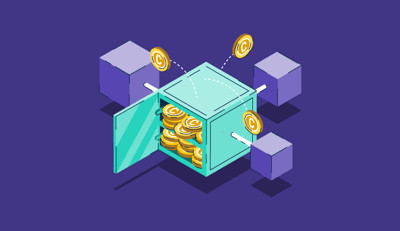In a world of digital asset supremacy, robust security is the need of the hour.
Given the risks and volatility of crypto markets, digital assets are vulnerable to cyber threats and scams. As a result, finding a safe storage for cryptocurrency is trickier than ever. However, there's a solution called hardware wallets that offers trust, reliability, and uncompromising security.
What is a hardware wallet?
A hardware wallet is a physical device that enhances cryptocurrency security by storing private keys offline. These keys are essential for accessing crypto holdings and other digital assets on the blockchain.
Unlike regular cryptocurrency wallets or software wallets, hardware wallets minimize the risk of exposing sensitive information to hackers and malicious tools by storing everything offline. It facilitates secure transactions and simplifies the management of multiple cryptocurrencies, such as Bitcoin, Ethereum, and Litecoin.
$53,074,827
was the amount of cryptocurrency lost due to hacks and frauds in April 2024.
Source: Immunefi
How do hardware wallets work
Hardware wallets don’t store cryptocurrency assets; they store the private key used to access them. They make it impossible for hackers to access their holdings because the private keys are isolated from the internet and kept safe in an offline environment. Anytime a user signs a transaction, the hardware wallet uses the private key to confirm it.
Through encryption, hardware components, offline storage, and two-factor authentication (2FA), hardware wallets create an untouchable environment for storing and managing private keys.
Here’s a quick breakdown of how this process takes place.
- Private key generation: At setup, a hardware wallet generates a unique pair of cryptographic keys–a private key and a public key. The private key is confidential and stored securely within the hardware wallet. The public key is used to receive cryptocurrency and is accessible to anyone.
- Transaction signature: The hardware wallet must be connected to a computer system or smartphone whenever a user wants to trade crypto. The wallet then secures the transaction by generating a digital signature using the private key. This allows for ownership verification.
- Crypto bridge broadcast: The connection between hardware wallets and the blockchain is managed via a crypto bridge. It broadcasts and confirms the signed transactions to the blockchain network.
- Device verification: Through the built-in touchscreen of hardware wallets, users can verify transaction details like the amount and recipient’s information. This provides an extra layer of security and control over the process.
Why are private keys important?
Cryptocurrency trading is a common blockchain application where all cryptocurrency data resides on the blockchain. Private keys link crypto owners and the blockchain, granting them access to the blockchain address and its content. Therefore, private keys play a vital role in establishing the security and ownership of crypto assets.
To add an extra layer of security, hardware wallets have strong backup and recovery mechanisms. When setting up the wallet, users are prompted to create a seed or recovery phrase that helps regenerate the private key. This seed phrase is a series of random words that act as a backup and restore the wallet in case of loss, damage, or theft.
Hardware wallets vs. software wallets
Crypto wallets are broadly categorized into two types: hot and cold wallets. Software wallets are hot wallets that are entirely digital and come in the form of software applications. Crypto hardware wallets are cold storage physical devices that keep private keys offline.
.png?width=600&height=375&name=Hardware%20Wallet%20vs.%20Software%20Wallet%20(1).png)
Hardware wallets offer a higher level of security for digital assets, but software wallets offer more convenience and easy access for users who engage in crypto transactions and trading frequently. Since software wallets operate through the internet, they are more vulnerable to cyber attacks.
The various security features offered by hardware wallets add up to their cost when software wallets are free to use. But the investment in a hardware wallet might be worth it for some users.
Ideally, software wallets are better for short-term use, and hardware wallets are more secure and dependable for long-term investment.

How to use a hardware wallet
The process of using a hardware wallet may vary depending on which manufacturer’s device you use. But some common steps involved in operating a hardware wallet include:
- Installing a companion application. Choose the best hardware wallet that meets your needs. Some popular ones include Ledger (Ledger Nano X, Ledger Stax, Ledger Nano S Plus, etc.) and Trezor (Trezor Model T, Trezor Model One, etc.) Visit the official website to download the mobile app or open-source desktop software.
- Connecting the crypto hardware wallet. Once installed, use a USB-C or wireless connection (Bluetooth, NFC, etc.) to connect the hardware wallet to the desktop/mobile device. Follow the app instructions to initialize the wallet. This includes setting up a security pin and seed phrase for backup and recovery.
- Adding funds and trade. Use the companion app to add the desired funds to your wallet. Enter the recipient’s public key address to transfer funds. Confirm transaction details using the hardware wallet screen.
- Confirming and signing transactions. Post confirmation, verify authorization by entering the PIN. This will allow the hardware wallet to sign a transaction using the private key stored in it.
Securely disconnect the wallet after the transaction is completed.
Things to look for in a hardware wallet
Choosing a reliable hardware wallet can be tricky, especially for beginners. Here’s a checklist to remember everything you need to look for in a hardware wallet.
- Compatibility: Ensure the crypto hardware wallet is compatible with your device and operating system (Android or iOS). Additionally, check for compatibility with other wallet interfaces.
- Cryptocurrency support: Some wallets may support limited cryptocurrencies. Check the list of currencies it supports to make sure it includes the ones you want to invest in.
- Available security features: Always check for robust security features when buying a hardware wallet. It should include support for pin codes, biometric authentication, passphrase protection, advanced encryption, etc.
- Backup and recovery support: In case of loss or damage, backup and recovery is your best friend. Ensure the wallet supports those functionalities and set it up for your private keys and recovery seed phrase.
Benefits of using hardware wallets
Hardware wallets have many advantages, especially compared to other cryptocurrency storage solutions like software wallets and online exchanges. Here are some of its key benefits.
- Offline storage: Hardware wallets keep private keys offline in “cold storage,” adding an extra security layer. By connecting to the internet only when in use, hardware wallets are safe from malware or other cyber threats.
- Multiple cryptocurrency support: By supporting multiple cryptocurrencies, hardware wallets serve as a reliable option for people looking to invest in various digital assets, including NFTs.
- Reliable recovery options: If a hardware wallet gets stolen, anyone else can’t access the content without the unique pin. Using the seed phrase, the owner can recover the holdings through another hardware device.
- Added convenience: Hardware wallets are small plug-in physical devices that are easily portable. They provide the convenience of accessing crypto assets from any location and time.
- Easy trading: Hardware wallets make trading easy, even for beginners. Many of them support wallet-to-wallet trading, making it easy to trade directly and without withdrawal limit fees.
Challenges of using hardware wallets
Despite the enhanced security features and benefits, hardware wallets come with certain challenges:
- High cost. Hardware wallets need to be manufactured and distributed, making them more expensive than software wallets. The added security is usually worth the investment for proficient traders but may not be ideal for new users.
- Learning curve. Despite the user-friendly interface, hardware wallets come with a learning curve. From setting them up and learning to navigate the interface to the backup and recovery process, users need a certain level of technical understanding to operate them.
- Physical vulnerabilities. Physical devices can get stolen, damaged, lost, or even tampered with. Owners need to go the extra mile to keep hardware wallets safe and locked to protect them against physical vulnerabilities.
- High maintenance and updates. Hardware wallets get firmware updates for bug fixes, security patches, and feature addition. They require regular maintenance to sustain functionality which can interrupt a seamless user experience.
Best practices for using hardware wallets
By understanding and addressing the challenges of using a hardware wallet, users can enjoy its benefits. Here are some best practices to keep in mind.
- Buy from a reputable source: When buying a cryptocurrency hardware wallet, always purchase from a trusted manufacturer. Make sure the wallet has a secure element chip for tamper-free use. Never use second-hand or unverified sources, as they might offer counterfeit devices.
- Set up the wallet in a safe environment: Use a secure connection and device when setting up a new wallet. Initiating the setup over a public network or shared device compromises security.
- Always verify transactions: Whenever you transfer funds, carefully check the transaction details on the hardware wallet’s screen before approving it. Verify the recipient’s address, transaction amount, and other critical information to prevent fraud.
- Store your wallet and seed phrase securely: To avoid theft and damage, safeguard the physical device and its seed phrase. Never store these digitally or take screenshots. Make a physical copy by writing it down and storing it safely.
- Keep the wallet updated: The firmware updates sent by managers are necessary to maintain the hardware wallet and keep it safe from any issues. These updates usually work on fixing security issues and bugs.
FAQs: Hardware wallets
Keep yourself informed by going through this set of frequently asked questions about hardware wallets.
Q. What does a hardware wallet do?
A. Hardware wallets protect cryptocurrency assets by keeping private keys in cold storage and protecting them from malware, viruses, and cyber threats like DDoS attacks.
Q. Do hardware wallets actually store crypto?
A. No, cryptocurrencies live on the blockchain. Hardware wallets only store the private keys that allow access to the blockchain address where those digital assets are kept.
Q. Do you lose your crypto if you lose your hardware wallet?
A. No, even if you lose the physical device, your crypto assets remain intact. As long as you have your seed phrase, you can recover the contents of your hardware wallet through a new device.
Q. What is the difference between a digital wallet and a hardware wallet?
A. Digital wallets are easier to use for daily transactions because they exist as an app on mobile devices. Hardware wallets are physical devices and provide superior security because they are offline. However, they need to connect to a computer to work, making them less convenient for daily use.
Q. Do hardware wallets have fees?
A. The hardware wallet itself comes with a cost that can go up to $200. But it won’t impose any other additional costs on the user. Besides that, users only need to be mindful of the fees usually associated with crypto trading.
Q. Can hardware wallets be hacked?
A. While nothing is 100% secure in today’s tech landscape, hardware wallets come with an added layer of security as they store private keys offline. This security measure isolates them from cyber attacks that software wallets are exposed to.
Welcome to the safe side
Whether you're a crypto novice or a seasoned adventurer in the blockchain realm, a hardware wallet is the solution for you. They strike the perfect balance between security and usability. And as the digital realm continues to evolve, hardware wallets will serve as a reliable solution to safeguard digital fortunes.
Users can minimize the risks associated with managing cryptocurrencies by staying informed on the common scams and phishing attempts and being mindful of the best practices of using hardware wallets.
Check out this visual guide on cryptocurrency mining and learn to use your crypto assets freely.

.png?width=600&height=375&name=Hardware%20Wallet%20vs.%20Software%20Wallet%20(1).png)

 by Washija Kazim
by Washija Kazim
 by Sagar Joshi
by Sagar Joshi
 by Washija Kazim
by Washija Kazim
 by Washija Kazim
by Washija Kazim
 by Sagar Joshi
by Sagar Joshi


